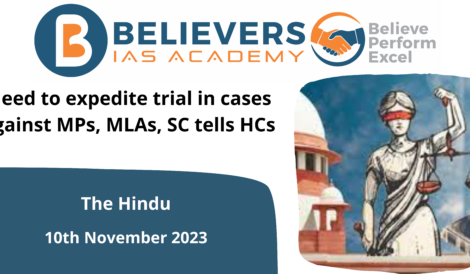Sedition — Illogical Equation Of Government With State
Context :
After receiving an assurance from the Union Government that this law will be reviewed as soon as possible, the Supreme Court of India issued an order in 2022 staying all ongoing actions as well as the registration of new cases under the sedition statute (S.G. Vombatkere v. Union of India). The Court’s stay order took into account how frequently law enforcement agencies were abusing this law.
Section 124A IPC
- Sedition is defined as an offence committed when “any person brings or attempts to bring into hatred or contempt, or excites or attempts to excite disaffection towards the government established by law in India” through spoken or written words, signs, visible representations, or other means.
- Disloyalty and all hostile emotions are included in disaffection. However, statements that do not incite or seek to incite hatred, contempt, or disaffection shall not be considered violations of this clause.
- This offence is not subject to bail. The range of penalties under Section 124A is three years to life in prison, with the option of an additional fine.
- An individual accused of violating this law is prohibited from working for the government.
- They are forced to live without their passports and are expected to regularly appear in court.
History:
- The Indian Penal Code’s Section 124A was first adopted in 1870, under British control, to put an end to dissent and protests against the colonial administration.
- The main goal was to prevent any voice of dissent or protest from being raised by Indians who spoke out against the British Raj.
Definition:
- Sedition is an offence against the government, not the nation as a whole, according to the definition.
- It entails fostering or attempting to foster hatred, contempt, or disaffection towards the legally-instituted authority.
- Sedition may be expressed orally or in writing, or it may take the form of signals or another form.
Different Interpretations throughout the British Period:
- There were two different interpretations of the law of sedition throughout the British period.
- According to one view, sedition was characterised as political hostility towards the government or disaffection, as was the case with Bal Gangadhar Tilak.
- The opposing view held that sedition had to be accompanied by incitement to violence or disruption, as was the case with Niharendu Dutt Majumdar.
1962’s Kedarnath v. State of Bihar Judgment:
- In this case, the constitutionality of sedition was decided by the Supreme Court.
- Sedition is an offence against the state since the government represents the state, and subverting the government puts the state’s survival in danger, according to the court, which found that sedition is constitutionally permissible.
- To protect the state’s security, Article 19(2) permits restrictions on freedom of speech and expression, including the use of the sedition statute.
Conflict with Freedom of Speech and Expression:
- According to Article 19(1)(a) of the Constitution, sedition, as defined in Section 124A, infringes on the basic right to free speech and expression.
- Since citizens have the freedom to express dissent and the ability to overthrow an inappropriate government, dissatisfaction with a government shouldn’t be viewed as a crime in a democratic republic.
Kedarnath judgement
- The Kedarnath judgement of the Supreme Court attempted to defend sedition as a fair restriction, but it did little to lessen the severity of the legislation.
- In the framework of a democratic republic, the court’s comparison of the two was irrational.
- The suggestion to include the propensity to instigate disruption in Section 124A does not lessen the strictness of the legislation and closely follows the interpretation of the Tilak decision.
Sedition Law Unconstitutionality:
- The text makes the case that Section 124A of the Indian Penal Code, which deals with sedition, is unconstitutional.
- The Law Commission overlooked the Kedarnath ruling’s flaw, which allowed sedition to be protected by the Constitution.
- The Kedarnath judgment’s linking of the government with the state is incompatible with the fundamental values of a democratic republic, making any attempt to use sedition as a justifiable restriction under Article 19(2) invalid.




